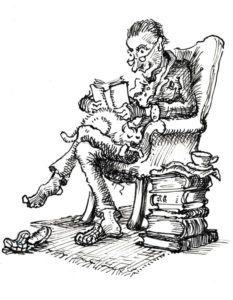GEORGES PEREC & CO
Georges Perec was a central figure in the Oulipo group of writers, founded in 1960 by Raymond Queneau and François Le Lionnais. Oulipo is an anacronym for Ouvroir de Littérature Potentielle, which translates as ‘workshop of potential literature,’ a loose gathering of mainly French-speaking writers and mathematicians who sought to create works using constrained writing techniques. Georges Perec’s most popular work, translated as either A Void or as A Vanishing, has become its figurehead. The story is simple: Anton Vowl is missing. Ransacking his Parisian flat, a group of his faithful friends trawl through his diary for any hint as to his location and, insidiously, a ghost from Vowl’s past starts to cast its malignant shadow… The novel is a lipogram, that is systematically avoids a certain letter, in this case the letter e (the most used letter in most alphabets). It has been translated into many languages, though in Spanish the text misses out the letter a (the most commonly used letter in that language). The New York Times book review remarked that there “is not a single ein this novel. That’s right: no here, there, where, when; no yes, no love, no sex!”
Perec, who died young in 1982 (aged 45), was a highly regarded French-Jewish novelist, essayist and filmmaker; most of his writing abounds with experimental wordplay, lists and attempts at classification, tinged usually with melancholy and garlic. In 1978, he won the Prix Médicis for his novel Life: A User’s Manual. The 99 chapters move like a knight’s tour of a chessboard around the room plan of a French apartment building, describing the rooms and stairwell and telling of each of its inhabitants. It is described as ‘novels,’ a series of related, overlapping stories.
The first recorded lipogram was by the Greek lyric poet Lasus (born in 548BC). The Odyssey of Tryphiodorus consisted of 26 books, with no ‘a’ in the first book, no ‘b’ in the second, and so on. It was said of the work that it could be improved greatly by removing all other letters from each of the books.
Californian musician Ernest Vincent Wright’s Gadsby, written in 1939, contained no letter ‘e’. To help him concentrate, Wright wrenched the letter ‘e’ from his typewriter keyboard. At the time it sold about 50 copies, but is now sought after highly and is extremely valuable.
Ella Minnow Pea, written by Mark Dunn in 2001, is a “progressively lipogrammatic epistolary fable.” The plot of the story deals with a small country that begins to outlaw the use of various letters, and each letter, as it is outlawed within the story, is no longer used in the text of the novel. It is not purely lipogrammatic, however, because the outlawed letters do appear in the text proper from time to time (these characters are then penalized with banishment from use) and when the plot requires a search for pangram sentences, all twenty-six letters are obviously in use. Also, late in the text, the author begins using letters serving as homonyms for the omitted letters (i.e. ‘ph’ in place of an ‘f,’ ‘g’ in place of ‘c’), which some might argue is cheating. (James Thurber wrote a short story in 1957 – The Wonderful O – about a country where the letter ‘o’ is illegal.)
Unhooking a DD-Cup Bra Without Fumbling is a 60,000word lipogrammatic thriller by Adam Adams, published in 2008, without the letter ‘e’. The protagonist swaps a quaint sanctuary in Bangkok for a hard-riding gothic road trip in Asia.
Eszperente is a lipogrammatic form of Hungarian, coined by Frigyes Karinthy (the author of Metropole).
Mike Schertzer’s poetry collection Cipher and Poverty (The Book of Nothing), published in 1998, pretends to have been written “by a prisoner whose world had been impoverished to a single utterance… who can find me here in this silence:” the poems use only these 4 vowels and 11 consonants only.
In Walter Abish’s 1974 novel Alphabetical Africa, the first chapter consists solely of words beginning with ‘a’. Chapter two adds words beginning with ‘b’, so on; chapter 26 sees all letters in use; this process is reversed over 25 chapters more.
Christopher Bok’s novel Eunoia (2001) restricts each chapter to a single vowel. A typical sentence: “Profs from Oxford show frosh who do post-docs how to gloss works of Wordsworth.”
One of the best known univocalic poems was written by C.C. Bombaugh in 1890, which centred on the vowel ‘o’ :-
No cool monsoons blow soft on Oxford dons,
Orthodox, jog trot, book-worm Solomons






